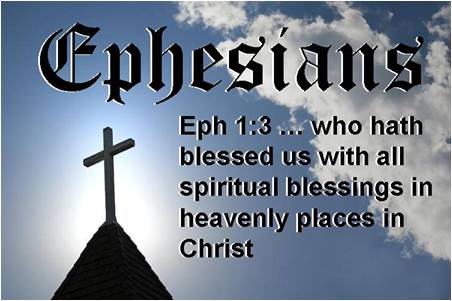 Ephesians is a “Prison Epistle,” along with Philippians, Colossians, and Philemon (see Eph 3:1, Eph 4:1, and Eph 6:20). Written by Paul from Rome, the epistle expands on themes in Colossians, much as Romans does to Galatians. Whereas Colossians develops the all-sufficiency of Christ to the Church, Ephesians shows the blessings of that “fullness” enjoyed by the members of God’s family. The idea of unity resulting from reconciliation runs strong through the book (Eph 1:9-10; Eph 2:16-18; Eph 3:4-6; Eph 4:3-6; Eph 5:30-32; Eph 6:18-20). It is possible that the epistle was actually a circular letter to the churches of Asia. Paul’s goal is to inform the saints of their privileged status and exhort them to live in a way worthy of their standing.
Ephesians is a “Prison Epistle,” along with Philippians, Colossians, and Philemon (see Eph 3:1, Eph 4:1, and Eph 6:20). Written by Paul from Rome, the epistle expands on themes in Colossians, much as Romans does to Galatians. Whereas Colossians develops the all-sufficiency of Christ to the Church, Ephesians shows the blessings of that “fullness” enjoyed by the members of God’s family. The idea of unity resulting from reconciliation runs strong through the book (Eph 1:9-10; Eph 2:16-18; Eph 3:4-6; Eph 4:3-6; Eph 5:30-32; Eph 6:18-20). It is possible that the epistle was actually a circular letter to the churches of Asia. Paul’s goal is to inform the saints of their privileged status and exhort them to live in a way worthy of their standing.
Gene Cunningham - May 23, 2000
Living Sacrifice 15
Scripture References: Hebrews 13:8, Romans 11:5, Acts 2:23, Romans 11:4-5, Romans 11:2, Romans 11:2-3, Philippians 3:3-8, Revelation 17:8, Romans 11:1-2, Revelation 13:8, Romans 11:6, Romans 11:1-6, Romans 8:29, Ephesians 2:8
From Series: "Living Sacrifice (1995)"
Romans 12 and specifically Rom 12:1-2 is a pivot point between the doctrinal section and application of the book. This series methodically uses this passage to outline aspects or doctrines of the christian life -- God's provision and our prospect. Our lives can be acceptable to God if we progress on the path He intends. Living Sacrifice presents 12 doctrines: (1) redeeming time; (2) standing (positional truth); (3) self-presentation - availability; (4) approval; (5) service; (6) provision; (7) spiritual warfare; (8) conformity; (9) spiritual advance; (10) renewal; (11) divine guidance; (12) abundant life.

